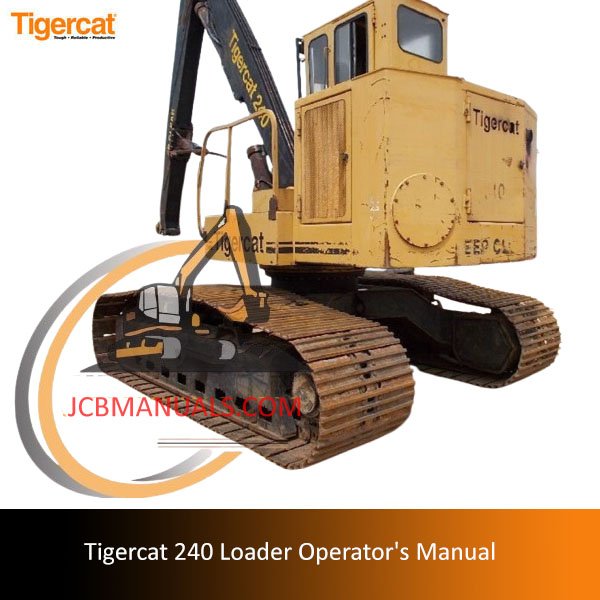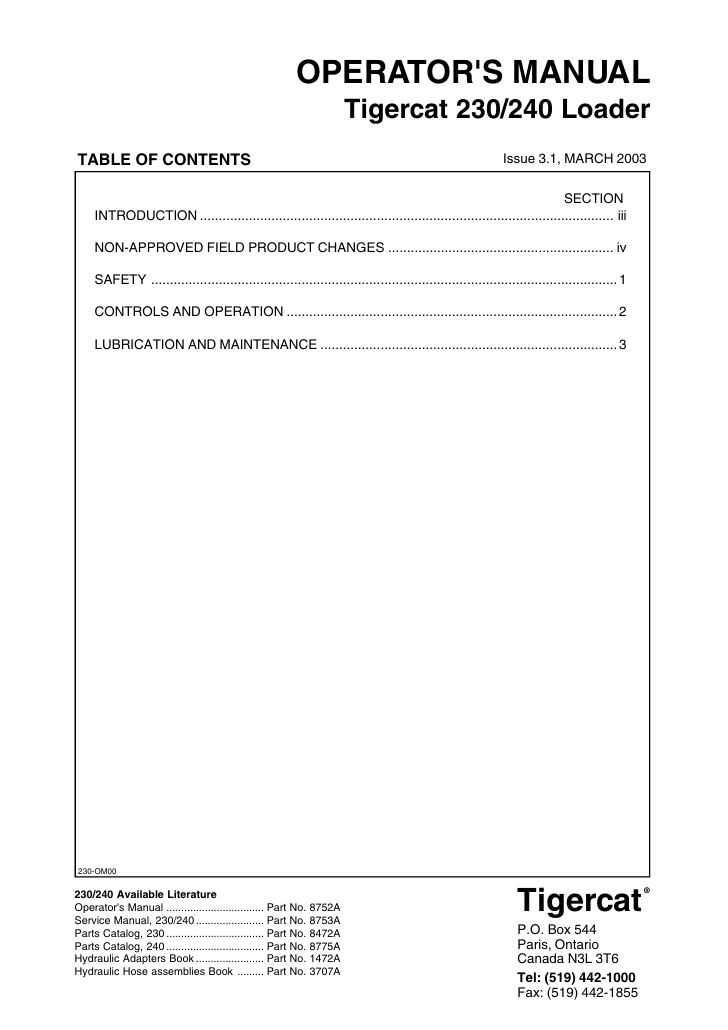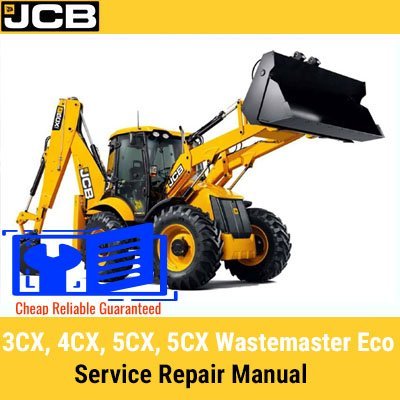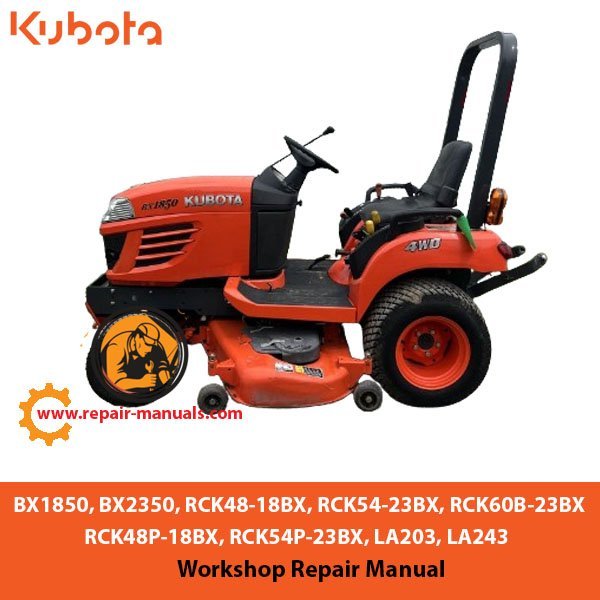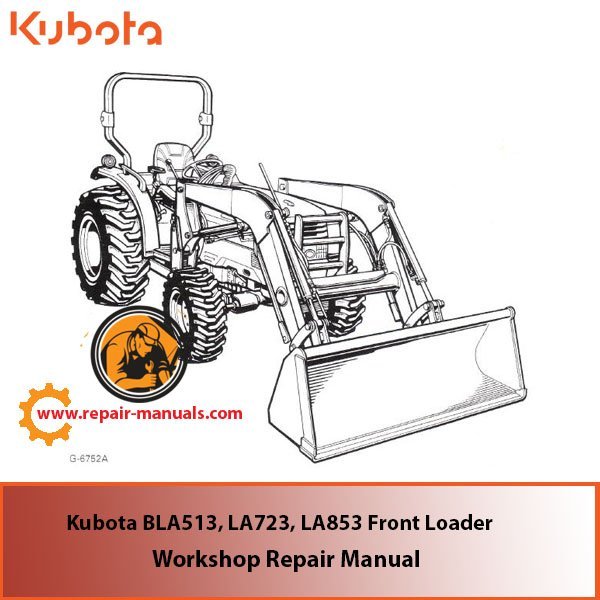| Package include | Tigercat 240 Loader Operator’s Manual |
| Language | English |
| File Format | |
| Total Number of pages | 56 |
| Publication Number | Issue 3.1, MARCH 2003 |
| Compatible | Windows system / Mac system / Android / IOS / Chrome OS / Any device capable of opening a PDF file |
| Additional Requirement | User must have any software that can open the pdf format |
| Shipping Policy | All of our products are digital and hence supplied immediately upon purchase. Once your purchase is complete, you will have immediate access to the product via a download link |
| Download Size | Total download size: 4 MB |
| Compatible Machine Models | Tigercat 240 Loader |
| Sample Preview Yes | Before purchasing the entire pdf handbook, please get sample preview of this pdf manual and ensure it is suitable with your model |
| Sample Preview Link | DOWNLOAD SAMPLE PREVIEW |
Overview of the Tigercat 240 Loader
The Tigercat 240 Loader is designed to excel in a variety of challenging work environments. This machine stands out in the industry due to its robust engineering and performance capabilities. Equipped with a powerful engine, the loader offers exceptional lifting capacity and maneuverability, making it ideal for tasks such as material handling, logging, and earthmoving. Its specifications detail a compact yet formidable structure that provides operators with the confidence to tackle demanding applications with ease.
One of the key features of the Tigercat 240 Loader is its versatility, which allows it to utilize numerous attachments, further enhancing its functionality. These attachments range from grapples and buckets to forks and winches, making it suitable for diverse operations. The loader’s quick-attach system simplifies the process of switching between attachments, therefore maximizing productivity on the job site. Operators can readily adapt the loader’s equipment to fit specific tasks, ensuring efficient utilization of resources.
Furthermore, the design advantages of the Tigercat 240 Loader are complemented by safety features that prioritize the well-being of both the operator and bystanders. Integrated safety measures include enhanced visibility through its cab design, the presence of stability controls, and various alert systems that monitor machine performance. These features work together to create a secure operating environment, essential for maintaining safety in various working conditions.
In summary, the Tigercat 240 Loader represents a blend of power, versatility, and safety, setting it apart in the competitive landscape of loader machinery. Its comprehensive capabilities, combined with its ability to adapt to various attachments, make it an invaluable asset for professionals in various industries.
Operating Procedures and Maintenance
The efficient operation of the Tigercat 240 Loader begins with understanding the essential procedures that ensure safety and effectiveness. Before starting the loader, operators should perform comprehensive pre-operational checks. This includes inspecting the hydraulic system for leaks, ensuring that the fluid levels are within the prescribed limits, and confirming that all safety devices are functional. A thorough review of the loader’s controls and instrumentation is also crucial, allowing the operator to familiarize themselves with the operational layout.
When ready to start the loader, it is recommended to follow a structured approach. First, ensure that the vicinity is clear of personnel and obstacles. Engage the parking brake and place the gear selector in neutral. Upon starting the engine, allow it to warm up to optimum operating temperature before engaging in any operational tasks. Operators must maintain awareness of load capacities as prescribed in the loader’s specifications to prevent overload scenarios, which can compromise both safety and performance.
During operation, proper load handling techniques play a vital role in maximizing productivity while ensuring stability. It is advisable to remain vigilant regarding the loader’s center of gravity and to adjust the load as necessary to maintain balance. Operators should also adhere to best practices for maneuvering, particularly in uneven terrain.
Maintenance of the Tigercat 240 Loader is equally important for sustaining performance over time. Operators should adhere to routine inspection schedules, examining critical components and systems. Regular servicing, including changing filters and fluids, will prevent potential breakdowns and extend equipment longevity. Additionally, operators should implement cleaning procedures after use, ensuring that the loader is free of debris and that its components remain in optimal condition.
In conclusion, effective operation and maintenance of the Tigercat 240 Loader hinge on proper procedures and systematic upkeep. By adhering to the outlined strategies, operators can enhance performance, reduce operational downtime, and ultimately contribute to the loader’s reliability in diverse working environments.

